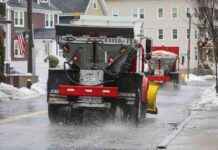Los Angeles County firefighters were seen attempting to put out a fire at a Bank of America as the Eaton Fire, which wreaked havoc on many homes and businesses, moved through Altadena, California on Jan. 8, 2025. The destructive scene was captured in a powerful image by Justin Sullivan / Getty Images.
Why should you trust us? Well, we’ve been around since 2005, starting as an Ohio-based environmental newspaper. Now, EcoWatch is a digital platform committed to sharing top-notch, science-based content on environmental issues, causes, and solutions.
The National Oceanic and Atmospheric Administration (NOAA) has been facing some tough times lately, with significant staff layoffs and funding cuts under the Trump administration. And now, they’ve dropped a bombshell – they’re no longer going to track the cost of climate crisis-fueled weather disasters, like heat waves, floods, and wildfires.
According to the agency, updates to its Billion-Dollar Weather and Climate Disasters database by the National Centers for Environmental Information (NCEI) will cease. This database, which spans back 45 years, will be archived, as reported by The Associated Press.
Democratic Representative from Illinois Eric Sorensen, who used to be a broadcast meteorologist before entering Congress, didn’t hold back, saying, “This administration thinks that if they stop doing the work to identify climate change that climate change will go away.” The Washington Post was quick to share his thoughts.
NOAA’s website claims that there have been no billion-dollar disasters up to April 8, 2025. But, hold on a minute – NCEI scientists, who manage the database, suggest that we’ve already had six to eight of these disasters this year alone.
The deadly wildfires that tore through Los Angeles earlier in the year are among these disasters. They left behind a trail of destruction, wiping out about $150 billion in property and infrastructure, making it the costliest disaster in U.S. history.
From powerful storms to floods and tornadoes, the U.S. has seen its fair share of damaging weather events this year. Severe thunderstorms, with their strong winds and hail, have been the most expensive type of disaster, accounting for roughly 75 percent of the record 28 billion-dollar disasters in the U.S. in 2023.
NOAA spokesperson Kim Doster attributed the decision to halt updates to the billion-dollar disaster database to “evolving priorities, statutory mandates, and staffing changes,” according to The Washington Post.
NOAA has been keeping tabs on hundreds of weather events across the country for years, racking up trillions in damage, as noted by The Associated Press. Without this database, assessing the total losses from individual disasters would be nearly impossible.
Jeremy Porter, co-founder of First Street, a financial modeling firm specializing in climate risk, highlighted the importance of NOAA’s database. He mentioned that without it, analyzing damage trends regionally or across different types of hazards would be a massive challenge without significant funding or access to commercial catastrophe models.
While private databases exist, they are limited in scope and not as readily shared due to proprietary reasons. The value of NOAA’s database lies in its standardized methodology over decades and access to exclusive data sources.
Jeff Masters, a meteorologist at Yale Climate Connections, emphasized the importance of the NOAA database, calling it the “gold standard” for evaluating the costs of extreme weather. He pointed out that alternative sources like international disaster databases and insurance brokers’ data just don’t measure up.
As experts link the intensifying extreme weather events to the climate crisis, the decision by NOAA to halt updates has raised concerns. Climate Central’s vice president of science, Kristina Dahl, stressed that disasters are escalating each year, and it’s crucial to highlight these events to show the impact of climate change on people.
So, yeah, climate change is real, and these disasters are a big deal. It’s kind of a big deal. And by not tracking them, we’re basically turning a blind eye to what’s happening around us. And that’s not cool.
If you want more exclusive updates, subscribe to our daily newsletter. By signing up, you’re agreeing to the Terms of Use and Privacy Policy, and you’ll receive our electronic communications, which may include promos, ads, and sponsored content.
Cristen, our writer extraordinaire, has a JD and an Ocean & Coastal Law Certificate from the University of Oregon School of Law, as well as an MA in Creative Writing from Birkbeck, University of London. She’s the author of some cool stuff, like The Smallest of Entryways and Ernest’s Way: An International Journey Through Hemingway’s Life.













